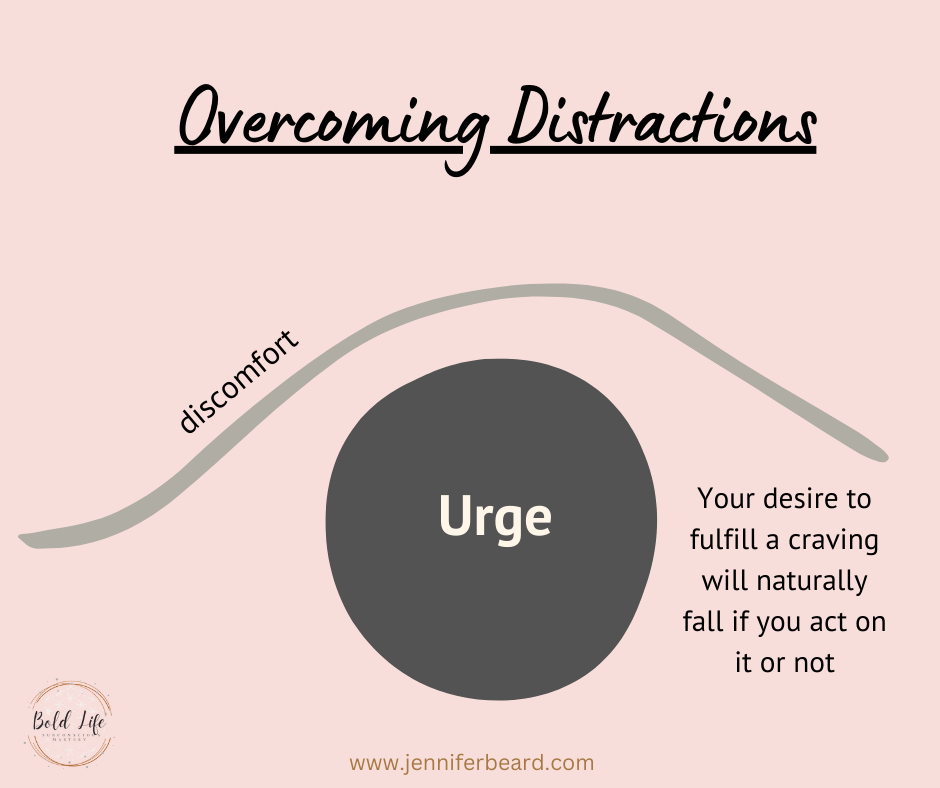
Master the Art of Overcoming Distraction
Get the Guide
A simple, encouraging guide to help parents confidently transition into homeschooling, build a customized learning rhythm, and create a thriving educational experience at home.
Homeschooling 101 Starter Guide
Family
FAVE LINKS
Topics
Hi, I’m Jennifer — transformation coach, homeschooling mentor, and guide for parents ready to create a life that truly fits. I help you break through fear, align with your values, and confidently design both your child’s education and your own bold, authentic life.

We are kept from our goals, not by an obstacle, but by a clear path to a lesser goal.
-Robert Braltt
In our journey toward our dreams, it’s not always big challenges that get in our way, but the small things that distract us. This means that distractions, like getting off track, can stop us from reaching what we really want.
But don’t worry! We can learn about distractions, why they happen, and how to deal with them. By understanding them better, we can stay focused on what truly matters to us.
In this post, we will explore distractions pervasive nature and unravel the mechanisms behind their alure to find ways to stay on the right path toward our goals.
People often see distractions as things that pull their attention away from what they’re supposed to be doing.
They might think distractions are everywhere, like noisy places or their phones buzzing with notifications.
Some people believe distractions are bad because they can stop them from finishing tasks or reaching their goals.
They might feel frustrated when they get distracted because it takes them away from what they want to do.
But distractions aren’t always seen as completely negative. Some think they can be good breaks or chances to think about something different for a while.
Many of us have experienced this as children. When a child gets emotionally triggered, parents and caretakers often use redirection to create a new focus for the child.
This is fine at times, but may become an ingrained habitual behavior over time causing us to unconsciously redirect our own attention when we don’t like current circumstances.
Although it may sometimes be intentional, it isn’t useful when we are trying to maintain our focus on important, and possibly unenjoyable, tasks.
What we know is, the reasons for distractions are both external and internal.
Resistence to Change
Despite recognizing the need for change, many individuals face resistance, whether due to the comfort of familiar routines or the daunting prospect of breaking ingrained habits understanding these reasons may be useful. They may include the following:
-
Difficulty concentrating: “I find it hard to focus for long periods, even when I try to minimize distractions.”
-
Overwhelm: “There are so many distractions in my environment that I don’t know where to start.”
-
Lack of awareness: “I don’t always realize I’m distracted, until after I’ve been distracted for some time.”
-
Habits: “I need my afternoon coffee, Facebook check-in, or snack.”
-
External factors: “I can’t control the distractions in my environment, like noisy neighbors or coworkers.”
-
Tech addiction: “I’m constantly drawn to my phone or computer, making it hard to stay focused on important tasks.”
-
Mental health challenge: “Anxiety or stress makes it difficult for me to concentrate, even when I try to minimize distractions.”
Even in the best circumstances we encounter distractions.
For instance, working from home presents a unique set of challenges, and I can certainly relate to the struggle of staying focused amidst the distractions that come with it.
From the stack of dirty dishes in the sink to the clutter that seems to multiply overnight, it’s all too easy to find myself drawn away from my tasks by the never-ending list of household chores.
And let’s not forget about the allure of post-work activities beckoning from just beyond my home office door, tempting me to trade productivity for relaxation.
By understanding the various factors contributing to distractions and acknowledging the resistance to change, we can begin to implement strategies to reclaim our focus and productivity.
Discomfort Breeds Distraction
Nir Eyal lists the following reasons in his book ‘Indistractable’ for why we get distracted.
-
Boredom creates the urge to check phone or social
-
Social anxiety makes us say yes to meetings
-
Stress leads to overeating
When we face boredom, anxiety, or stress our minds seek relief through distraction.
The only way to handle distraction is by learning to handle discomfort.
-Nir Eyal
Nir Eyal talked about a study from 2010 where researchers looked at flight attendants who smoked.
They split the attendants into two groups: one group smoked as usual during breaks, and the other group didn’t smoke at all.
The surprising part was that both groups felt the same relief afterward. Even the attendants who didn’t smoke saw their cravings go down after the break!
The next time you feel the urge to distract yourself, the best course of action is to persist with the activity you originally intended, even through the discomfort.
You’ll find that the urge or craving to distract yourself naturally fades away on its own.

On a 7 day study, smokers who allowed themselves to feel the urge and didn’t follow through on it reduced their cigarette cravings by 37%.
This strategy is sure to work for other urges as well.
Nir Eyal says most waves of discomfort last approximately 8 minutes so if we can hold off on reacting to the urge for 10 minutes we can change our behavior over time.
“If I find myself wanting to check my hone as a pacification device when I can’t think of anything better to do, I tell myself, ‘It’s fine to give in, but not right now. I have to wait 10 minutes.
This method is a real lifesaver when it comes to handling potential distractions, whether it’s stopping myself from Googling random things instead of writing, steering clear of unhealthy snacks when I’m bored, or resisting the temptation to binge-listen to just one more podcast when I should really be heading to bed.
Create New Agreements with Yourself
Eyal says, “The antidote to impulsiveness is forethought.” His suggestions are to use motivation to avoid urges from the onset of your project.
-
Effort – Introduce effort as a barrier between yourself and the task you wish to avoid. For instance, place your phone across the room or out of the room altogether to deter impulsive checking.
-
Price – Attach a cost to your distractions. For instance, if sweets are your weakness, make a pledge to a friend that you’ll burn $50 if you indulge (and send them a video of you carrying out your commitment if you break it).
-
Identity – Reinforce your commitment by publicly declaring it. Whether it’s proclaiming “I am a vegetarian” or including an “I don’t respond to emails before noon” statement in your email signature, solidify your identity and intentions to strengthen your resolve.
As we navigate the complexities of modern life, honing the art of overcoming distractions isn’t just a bonus—it’s a must for reaching our goals.
By taking proactive steps to boost our focus, we set ourselves up for success, making our workdays more efficient and our dreams more achievable.
While the road to reclaiming our attention might seem a bit daunting sometimes, every little effort we put in brings us closer to taking charge of our time and energy.
So, let’s tackle this challenge head-on with a mix of patience and determination, knowing that the payoff of sharper focus and increased productivity is well worth the journey.
Together, let’s jump into this adventure toward a more mindful and purposeful way of life.
If you are interested in adopting the beliefs and behaviors to hold your focus easily, schedule a session with me HERE.
Best wishes,
Jennifer
p.s. Stay ahead of the game and join our community! Sign up for our weekly newsletter HERE to get exclusive insights, tips, and strategies right in your inbox. Don’t miss out on the chance to elevate your journey every week.
Michigan Life Coaching, Personal Growth, and PSYCH-K®️. Taking your life to the next level and creating the abundance you deserve.
Productivity
Homeschooling
authenticity
intuition
BeLIEF CHANGE
Browse the categories
JenniferBeard.com 2025. All Rights Reserved.
17195 Silver Lake Parkway #136 Fenton, MI 48430 | PRIVACY | TERMS
Hi, I’m Jennifer — transformation coach, homeschooling mentor, and guide for those who are ready to create a life that truly fits. I help you break through fear, align with your values, and confidently design both your child’s education and your own bold, authentic life.
HAPPINESS STARTS
WITH YOU!
Get this practical guide for living a life of joy now!
Start homeschooling confidently
Get the homeschool guide
Check out our private coaching



Comments Off on Master the Art of Overcoming Distraction